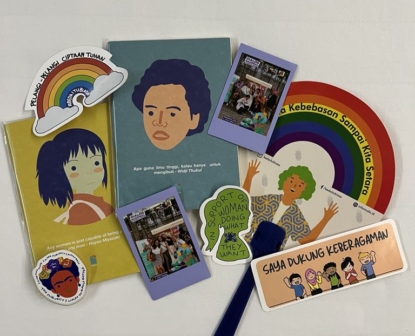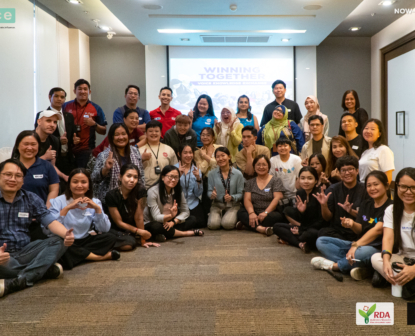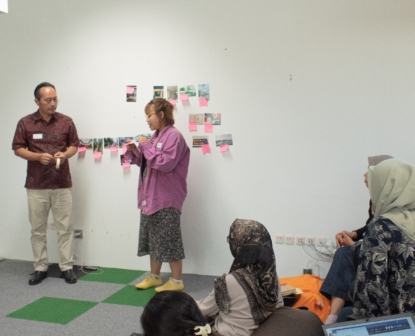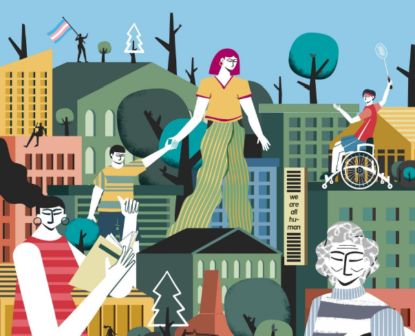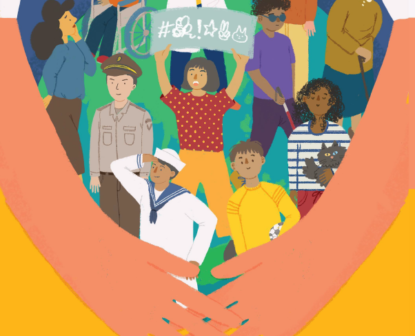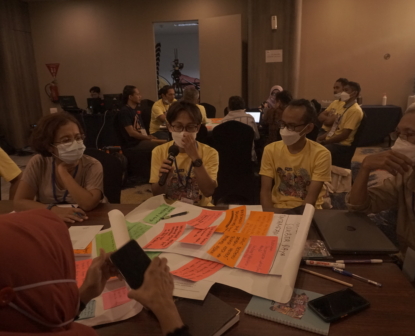Project
Connecting Voice(s) in Indonesia II
-
Amount Funded
171,441 EUROProject Duration
01 Jan 2023 - 30 Jun 2024 -
-
Lead organisation
-
Pamflet is a youth-led organisation established to encourage and strengthen youth to participate in the process of social movement, by providing information and knowledge about activism and human rights. With three core divisions: Youth studies, Youth movement, and Youth activism.
Pamflet works to strengthen youth’s access to information, resources, and networks related to human rights, and to encourage local youth initiatives (individual/collective) in different areas in Indonesia. This is done through activities such as research, capacity building, training, creative campaigning, and publication.
Pamflet is registered as an association and consists of a number of young people under 35 from diverse educational backgrounds and experiences, i.e. communication studies, sociology, political science, psychology, philosophy, and public health. Such diversity enriches and enables them to work in a multidisciplinary manner. With a relatively small organisational structure, they conduct each activity by networking with other organisations effectively. Their funding comes from donor agencies and fundraising activities.
-
Organisation
Pamflet is a youth-led organisation established to encourage and strengthen youth to participate in the process of social movement, by providing information and knowledge about activism and human rights. With three core divisions: Youth studies, Youth movement, and Youth activism.
Pamflet works to strengthen youth’s access to information, resources, and networks related to human rights, and to encourage local youth initiatives (individual/collective) in different areas in Indonesia. This is done through activities such as research, capacity building, training, creative campaigning, and publication.
Pamflet is registered as an association and consists of a number of young people under 35 from diverse educational backgrounds and experiences, i.e. communication studies, sociology, political science, psychology, philosophy, and public health. Such diversity enriches and enables them to work in a multidisciplinary manner. With a relatively small organisational structure, they conduct each activity by networking with other organisations effectively. Their funding comes from donor agencies and fundraising activities.
-
Project
Pamflet is the Linking and Learning Facilitator for Voice in Indonesia. Voice Linking and Learning refer to the total of activities, processes and trajectories realised to boost collaboration, connectedness, sharing, listening, learning, innovation and innovation of new knowledge among grantees. It aims to produce evidence, learnings and innovative solutions to catalyse transformative change to promote diversity and inclusion. Pamflet works in straight collaboration and coordination with Voice Indonesia as well as the Voice global coordination team. We believe that as a facilitator in Linking and Learning, we are able to support grantees to reach their full potential through collaboration and working together as a community.
During Pamflet’s two years of involvement with Voice as an Empowerment grantee, Phase 1 and Phase 2, we understood that learning from each other and networking is essential for any civil society organization. So far, Linking & Learning has provided spaces for grantees to learn from one another and network, but it has not encouraged significant collaboration between organisations on issues that are contextual to the realities of civil society in Indonesia. We encourage collaboration so that each grantee understands the other and gains experience in working on various issues.
-
-
Pamflet is the Linking and Learning Facilitator for Voice in Indonesia. Voice Linking and Learning refer to the total of activities, processes and trajectories realised to boost collaboration, connectedness, sharing, listening, learning, innovation and innovation of new knowledge among grantees. It aims to produce evidence, learnings and innovative solutions to catalyse transformative change to promote diversity and inclusion. Pamflet works in straight collaboration and coordination with Voice Indonesia as well as the Voice global coordination team. We believe that as a facilitator in Linking and Learning, we are able to support grantees to reach their full potential through collaboration and working together as a community.
During Pamflet’s two years of involvement with Voice as an Empowerment grantee, Phase 1 and Phase 2, we understood that learning from each other and networking is essential for any civil society organization. So far, Linking & Learning has provided spaces for grantees to learn from one another and network, but it has not encouraged significant collaboration between organisations on issues that are contextual to the realities of civil society in Indonesia. We encourage collaboration so that each grantee understands the other and gains experience in working on various issues.
-
Introduction
After being involved in Voice as a grantee partner in 2017-2019, Pamflet Generasi had the opportunity to be the facilitator for Voice Linking and Learning programme in Indonesia throughout 2020 to 2024. The grantees and rightsholders come from a variety of regions in Indonesia, spreading from the west to the east.
Impact and Transformation
Over the past four years, Pamflet has facilitated and collaborated with over 50 organizations, resulting in 84 collaborative knowledge products that embody the spirit of change. These products include documentaries, bulletins, podcasts, videos, and articles. Pamflet’s accomplishment in encapsulating the complexities of intersectionality—highlighting the issues of gender diversity, indigenous communities, and individuals with disabilities—is a significant accomplishment. One of the collaborations that capture this spirit is the short documentary ‘Di Batas Identitas’, meaning ‘In the Borders of Identity’. Disseminated through limited offline screenings throughout Pamflet’s facilitation period, the film focuses on the genuine obstacles encountered by people with diverse identities as they endeavor to establish a secure and prosperous existence.
“There are issues that I was rarely connected to before, but in Link and Learn I became connected, especially for example issues with gender minorities and how to treat our friends with disabilities,” – anonymous grantee in Pamflet’s Endline Evaluation.
Pamflet is a youth-led organization that is committed to ensure that all youth have the right to enjoy their human rights. Pamflet has developed innovative and engaging facilitation methods that are engaging and enjoyable, thereby encouraging all participants, including people with disabilities and other important rights-holder groups, to actively participate. These methods are based on our experience in facilitating youth. Pamflet’s main objective is to ensure that activities are conducted in an inclusive way, thus letting all individuals participate in meaningful ways.
“The activity durations are good, the implementers and facilitators are not rigid and make the atmosphere of the activity fun, simple language is also used so that it does not make it difficult to digest every meaning of the words conveyed, there is a quiet room, there are repeated reminders to always apply the principles of inclusion.” – anonymous grantee in Pamflet’s Endline Evaluation.
At the beginning of each facilitation period, Pamflet starts with an internal capacity-building and values clarification session with the grantees, covering key topics such as gender mainstreaming, indigenous rights, disabilities, inclusion, and intersectionality. The main goal of this session is to help Pamflet develop more effective approaches to meeting the needs of the grantees. Following this, regular quarterly meetings are held to strengthen relationships and share information between Pamflet and the grantees.
The Linking and Learning Workshop is what comes next in the process, which is designed to ensure that the grantees and Pamflet share a common vision and values. At the end of the period, Pamflet convenes a national meeting to reflect on the linking and learning process and consider its future. Furthermore, the Indonesia Inklusi National Dialogue facilitates multi-stakeholder collaboration in the pursuit of inclusivity, equality, and justice for vulnerable groups by bringing rights holders and stakeholders together.
During this period, four Communities of Practice (CoP) emerged from the Linking and Learning Workshop: advocacy for inclusion, organizational sustainability, inclusive creative campaigns, and art and research in DEIA (diversity, equity, inclusion, and accessibility). One significant achievement was the participation of the Art and Research CoP in Urban Social Forum #10, where grantees such as Gerkatin Solo, Komunitas KAHE, PERWAKAS, and others shared their experiences creating inclusive art spaces. Furthermore, collaborations such as the Photovoice Workshop, inspired by Kota Kita’s methods, resulted in presentations that addressed issues of inclusivity and intersectionality. This method was also adopted and further developed by organizations like BRAVE Consortium, LRC-KJHAM, and Lakoat.Kujawas to support campaigns and research within their communities.
One of the organic impacts that emerged after the implementation of Linking and Learning was the development of mutually supportive relationships among most of the organizations involved. Pamflet’s perspective: beyond the framework of the Linking and Learning program, Pamflet successfully built strong and supportive relationships with the grantees. This is evident in several instances, such as the ongoing collaboration between Pamflet and Minikino despite our different focuses, or in the participation of grantees and rightholders such as YAPESDI (Yayasan Peduli indroma Down) in Pamflet’s activities. These relationships reflect a sense of mutual trust and good cooperation, strengthening the Indonesia Inklusi network.
Lesson Learned
The biggest learning of all from the full project period comes from learning about intersectionality. The Linking and Learning activities allowed us to meet with a substantial number of grantees, rightholders, and stakeholders working within the five rightsholder groups issues. Without a doubt, the encounters pushed us to learn–and even relearn/update our existing knowledge–about gender, sexuality, youths and elders, indigenous people, decolonization, disabilities, workers’ rights, to even collective care and wellbeing. Not only learning about these issues, the activities implemented challenge us to experiment with intersectionality. We always ask ourselves these questions: What different identities or issues should we combine in order to enrich learnings? How should we carry our activities so that it does not exclude grantees with different needs? What knowledge of structural and cultural injustice do we need to update ourselves on?
From this process, we also realized that contextualization must be a top priority to ensure meaningful participation by every rights holder. For example, we designed topics and approaches that are sensitive to the needs of diverse gender and sexuality groups, people with disabilities, and various age groups. We held preparatory meetings to ensure complete access to information and to meet the needs of the participants. This step serves as a starting point for implementing more accommodating activities, which we continually refine based on feedback and suggestions from participants.
In the process of linking and learning, collaborations like the Photovoice Workshop have become meeting spaces for various cross-issue organizations to voice the spirit of change. The organizations involved, such as Jaringan Transformasi Indonesia (JTID), which focuses on gender diversity; Indonesia untuk Kemanusiaan (IKa), which focuses on the elderly and human rights violations; LBH APIK Jakarta, which addresses violence against women; and Lakoat.Kujawas, which highlights issues affecting youth and indigenous communities, demonstrate how intersectionality serves as the principle linking these processes. This collaboration not only produced creative works, but also encouraged deep reflection on how various forms of injustice overlap, and strengthened their work through documentation methods like Photovoice.
Another aspect that we struggled with but tremendously learn from is on youth-adult partnership. As a youth-led organization, having to facilitate such a diverse pool of actors were challenging. Ageism and the assumption that youth lack experience have been challenges that were gradually addressed during the linking and learning process. Eventually, adjustments and acceptance across age groups have progressed well. Both sides provided opportunities for each other and listened to each other’s aspirations. Pamflet has received support from adults who are open to discussing and supporting the methods and approaches used. In this process, we have also learned the importance of believing in ourselves and our capacities while keeping an open mind to update our knowledge on inclusivity.
“Older people usually stick to methods they are familiar with. So, it’s refreshing to have activities that are more modern. We’ve already used this new approach to facilitate government activities, and it turns out it works well.” – anonymous grantee in Pamflet’s Endline Evaluation.
Conclusion
For a youth-led organization like Pamflet, gaining the trust to facilitate various organizations from different regions and focus areas is a rare opportunity. The spirit of “linking and learning,” especially the principles of intersectionality and inclusivity in implementing this mechanism, has inspired Pamflet to replicate these practices in our work. More concretely, Pamflet now harbors a grand vision to become a hub connecting youth movements across Indonesia—bridging issues, identities, and backgrounds.
We embrace and uphold the values of intersectionality and inclusivity as organizational principles. Pamflet’s work contributes to Voice’s goals by guaranteeing everyone’s entitlement to their rights. Although this journey is still long, we believe that the spirit of linking and learning, which Pamflet will continue to champion, can serve as a foundation for synergy and collaboration among organizations and individuals within the Indonesia Inklusi network.
-
News


